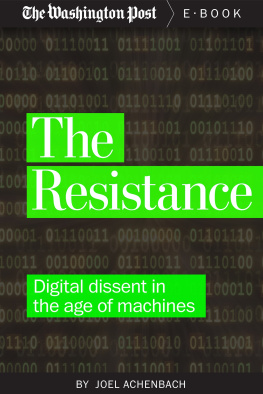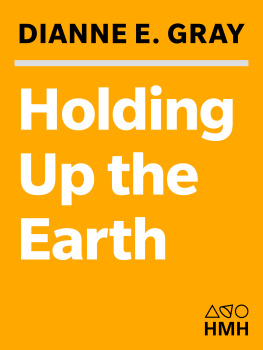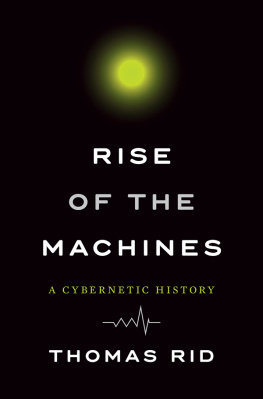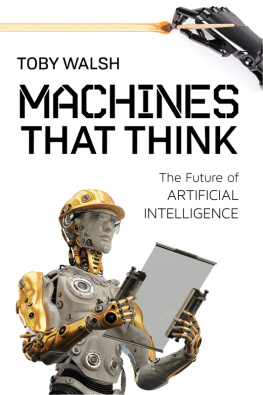How Invention Begins
How Invention Begins
Echoes of Old Voices in the Rise of New Machines
JOHN H. LIENHARD


Oxford University Press, Inc., publishes works that
further Oxford Universitys objective of excellence
in research, scholarship, and education.
Oxford New York
Auckland Cape Town Dar es Salaam Hong Kong Karachi
Kuala Lumpur Madrid Melbourne Mexico City Nairobi
New Delhi Shanghai Taipei Toronto
With offices in
Argentina Austria Brazil Chile Czech Republic France Greece
Guatemala Hungary Italy Japan Poland Portugal Singapore
South Korea Switzerland Thailand Turkey Ukraine Vietnam
Copyright 2006 by John H. Lienhard
Published by Oxford University Press, Inc.
198 Madison Avenue, New York, NY 10016
www.oup.com
Oxford is a registered trademark of Oxford University Press
All rights reserved. No part of this publication maybe reproduced, stored in a retrieval system, or transmitted, in any form or by any means, electronic, mechanical, photocopying, recording, or otherwise, without the prior permission of Oxford University Press.
Library of Congress Cataloging-in-Publication Data
Lienhard, John H., 1930
How invention begins : echoes of old voices
in the rise of new machines / John H. Lienhard.
p. cm. Includes bibliographical references and index.
ISBN-13: 978-0-19-530599-9
ISBN-10: 0-19-530599-X
1. InventionsHistory.
I. Title.
T15.L485 2006
609dc22
2005030825
9 8 7 6 5 4 3 2 1
Printed in the United States of America
on acid-free paper
Contents
The narrator/ringmaster in the musical The Fantasticks begins the show by introducing its characters. Then, as he prepares to put them into action, he utters a wonderful line. You wonder how these things begin, he says. Well, this begins in a glen. It begins in a forest where woodchucks woo and vines entwine like lovers.
Beginnings of the important things in our lives are like that. They are quiet and invisiblenot like the band-accompanied launching of a ship or the firing of a rocket into space. The ship might have begun with a student sitting on the rocks above the sea, hypnotized by the movement of a boat in the cove below or reading stories of the sea. Perhaps the Saturn rocket can be traced back to a child who watched Fourth of July fireworks, or read about Buck Rogers and Flash Gordon, and then asked, Why not me? Invention has fermented alone inside their heads, but it has also been driven by the voices of their communities.
We eventually realize that an elusive a priori essence hovers over all invention; we sense its presence, but it can be fiendishly hard to trace. Too much has always gone on before we get around to assigning priority to the creation of any new thing. Invention is a powerful part of the human psyche. But its texture and form are quite different from the cartoon images that we often use to represent it. We all want to foster the creative improvement of our world, and that alone is reason to spend this time sorting out the meaning of invention.
It is one thing to make the fairly obvious assertion that human invention is ever-present and that it is always accompanied by a communal synergy of ideas. To learn what invention is truly made of, we need to do more than just make that bland assertion. We also need to connect, viscerally, with its seeming contradictionthe coexistence of individual creativity and communal reinforcement. If we fail to ingest the contradiction, we can easily be tricked by a simplistic reading of the law of the excluded middlethe either/or requirement that disallows multiple explanations for one result.
The fabric of causality becomes terribly complex in the case of invention. That is why we do better if we begin with a seemingly illogical acceptance that invention is the emergence of a collective idea at the same time as it is an expression of one persons genius. Once we make that willing suspension of common sense, we are in a position to start looking for ways that the individual and the community form two facets of a single cause.
To undertake this process, let us spend a certain amount of time on the pathway of anecdote in preference to the straight highway of exposition. I ask you to join me in tracing folklore and historyto play with the mosaic of stories until a picture emerges from scattered tiles. Let us allow invention to reveal itself in very much the same way as it reveals itself to any inventorby mutating from a jumble of ideas into a whole.
As we pursue this path, we shall (insofar as I am successful) come to better appreciate the vast sequences of invention that produce whole technologies. We see the word invention assigned offhandedly to such technologies as the airplane, the steam engine, the printed book, and more. I give away little of my story to say that, at the end, I need to propose a new word to describe these huge aggregates of invention. That way, we can reserve the fine word invention for the contributions that we all make repeatedly in daily lives.
Indeed, the aggregation of invention goes beyond even that. For example, we eventually realize that thousands of people applied their corporate inventive genius to something larger than airplanes, railroad engines, or automobiles. A collective desire, an upwelling of fascination and desire, a spirit of the timesa Zeitgeistlaid its hold upon them. The thing that they all sought to create was speed itself.
We likewise can hardly trace the astonishingly complex technology of printing books without coming at last to that which we desire from booksthe knowledge, the learning, that books provide. Can we speak of speed or education as inventions? I suggest that it is no more of a stretch to do that than it is to call radio or the telephone an invention.
Undertaking these matters has been an ever-opening-up voyage of discovery for me, and so many people have been a huge help along the way. First in any such list must be my wife, Carol, who has read and commented upon draft after draft of each chapter. I am grateful to art and architectural historian Margaret Culbertson, who read the full manuscript and provided a great deal in the way of background advice and sources of illustrations. Medical historian Helen Valier (and her mother) also read the entire manuscript and provided a detailed, and very useful, commentary. My thanks as well to a large number of people who read and provided advice on selected chapters: Joyce Derlacki, Steven Mintz, James Pipkin, and Andrea Sutcliffe, as well as three anonymous external reviewers.
My thanks to the good people at Oxford University Press: editor Peter Prescott for his ongoing support and cogent advice; his assistant, Kaity Cheng, for so smoothly shepherding the book through the many hurdles of the book-making process; production editor Helen Mules for the grace with which she turns raw copy into this final form; copy editor Sue Warga for her deft touch; and all the other production people who function so effectively in comparative anonymity. I have also extracted more ongoing advice than anyone is entitled to from my generous colleagues: Sara Fishman, Barbara Kemp, Catherine Patterson, Stephen Perkins, and Lewis Wheeler. All these, and too many whom, by failing to keep proper track, I have failed to name have joined in along the way. Finally, my thanks to the fine ongoing support of the staff of the radio station KUHF-FM Houston.
Next page












